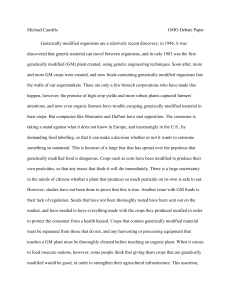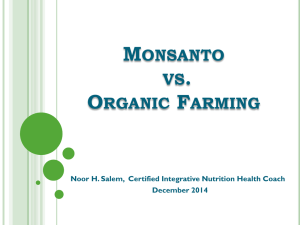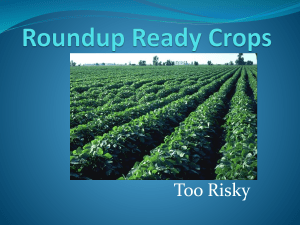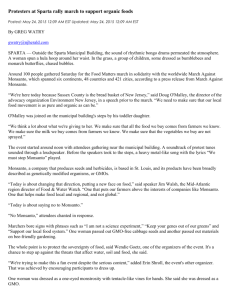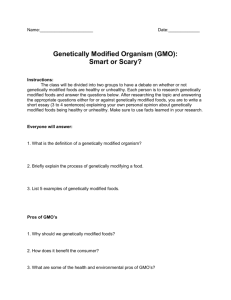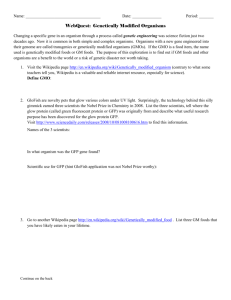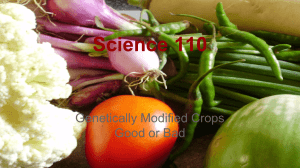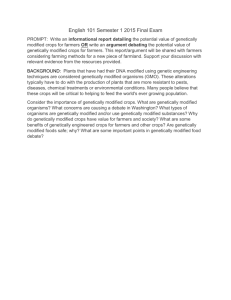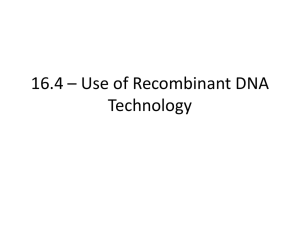THE THREATS FROM GENETICALLY MODIFIED FOODS. Lexile
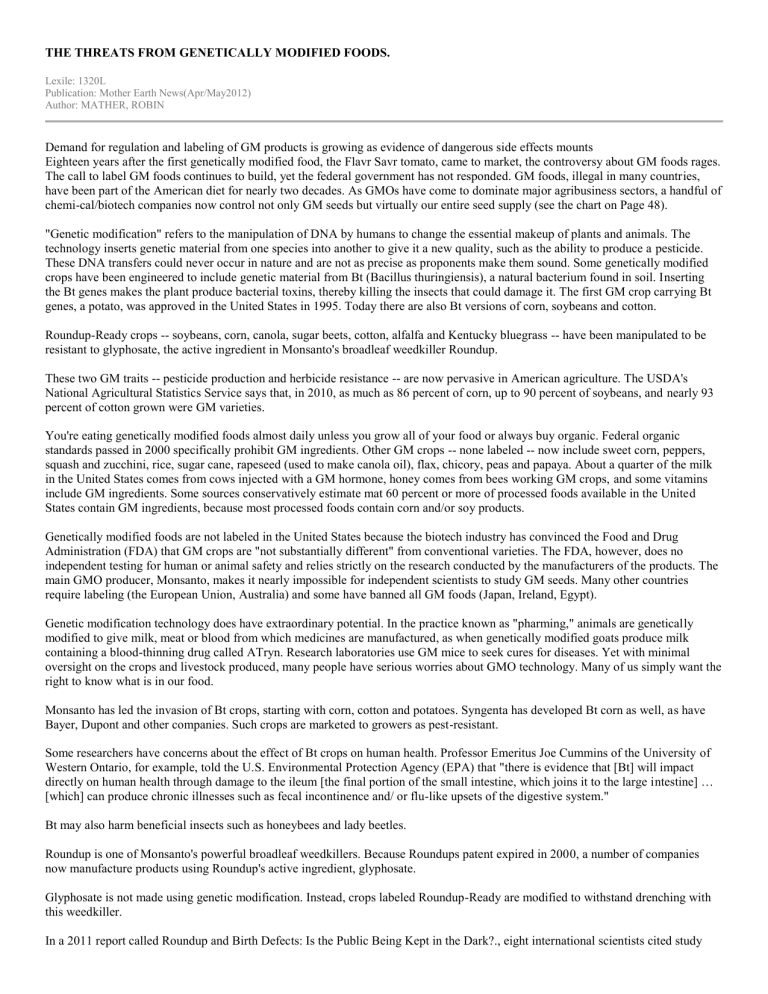
THE THREATS FROM GENETICALLY MODIFIED FOODS.
Lexile: 1320L
Publication: Mother Earth News(Apr/May2012)
Author: MATHER, ROBIN
Demand for regulation and labeling of GM products is growing as evidence of dangerous side effects mounts
Eighteen years after the first genetically modified food, the Flavr Savr tomato, came to market, the controversy about GM foods rages.
The call to label GM foods continues to build, yet the federal government has not responded. GM foods, illegal in many countries, have been part of the American diet for nearly two decades. As GMOs have come to dominate major agribusiness sectors, a handful of chemi-cal/biotech companies now control not only GM seeds but virtually our entire seed supply (see the chart on Page 48).
"Genetic modification" refers to the manipulation of DNA by humans to change the essential makeup of plants and animals. The technology inserts genetic material from one species into another to give it a new quality, such as the ability to produce a pesticide.
These DNA transfers could never occur in nature and are not as precise as proponents make them sound. Some genetically modified crops have been engineered to include genetic material from Bt (Bacillus thuringiensis), a natural bacterium found in soil. Inserting the Bt genes makes the plant produce bacterial toxins, thereby killing the insects that could damage it. The first GM crop carrying Bt genes, a potato, was approved in the United States in 1995. Today there are also Bt versions of corn, soybeans and cotton.
Roundup-Ready crops -- soybeans, corn, canola, sugar beets, cotton, alfalfa and Kentucky bluegrass -- have been manipulated to be resistant to glyphosate, the active ingredient in Monsanto's broadleaf weedkiller Roundup.
These two GM traits -- pesticide production and herbicide resistance -- are now pervasive in American agriculture. The USDA's
National Agricultural Statistics Service says that, in 2010, as much as 86 percent of corn, up to 90 percent of soybeans, and nearly 93 percent of cotton grown were GM varieties.
You're eating genetically modified foods almost daily unless you grow all of your food or always buy organic. Federal organic standards passed in 2000 specifically prohibit GM ingredients. Other GM crops -- none labeled -- now include sweet corn, peppers, squash and zucchini, rice, sugar cane, rapeseed (used to make canola oil), flax, chicory, peas and papaya. About a quarter of the milk in the United States comes from cows injected with a GM hormone, honey comes from bees working GM crops, and some vitamins include GM ingredients. Some sources conservatively estimate mat 60 percent or more of processed foods available in the United
States contain GM ingredients, because most processed foods contain corn and/or soy products.
Genetically modified foods are not labeled in the United States because the biotech industry has convinced the Food and Drug
Administration (FDA) that GM crops are "not substantially different" from conventional varieties. The FDA, however, does no independent testing for human or animal safety and relies strictly on the research conducted by the manufacturers of the products. The main GMO producer, Monsanto, makes it nearly impossible for independent scientists to study GM seeds. Many other countries require labeling (the European Union, Australia) and some have banned all GM foods (Japan, Ireland, Egypt).
Genetic modification technology does have extraordinary potential. In the practice known as "pharming," animals are genetically modified to give milk, meat or blood from which medicines are manufactured, as when genetically modified goats produce milk containing a blood-thinning drug called ATryn. Research laboratories use GM mice to seek cures for diseases. Yet with minimal oversight on the crops and livestock produced, many people have serious worries about GMO technology. Many of us simply want the right to know what is in our food.
Monsanto has led the invasion of Bt crops, starting with corn, cotton and potatoes. Syngenta has developed Bt corn as well, as have
Bayer, Dupont and other companies. Such crops are marketed to growers as pest-resistant.
Some researchers have concerns about the effect of Bt crops on human health. Professor Emeritus Joe Cummins of the University of
Western Ontario, for example, told the U.S. Environmental Protection Agency (EPA) that "there is evidence that [Bt] will impact directly on human health through damage to the ileum [the final portion of the small intestine, which joins it to the large intestine] …
[which] can produce chronic illnesses such as fecal incontinence and/ or flu-like upsets of the digestive system."
Bt may also harm beneficial insects such as honeybees and lady beetles.
Roundup is one of Monsanto's powerful broadleaf weedkillers. Because Roundups patent expired in 2000, a number of companies now manufacture products using Roundup's active ingredient, glyphosate.
Glyphosate is not made using genetic modification. Instead, crops labeled Roundup-Ready are modified to withstand drenching with this weedkiller.
In a 2011 report called Roundup and Birth Defects: Is the Public Being Kept in the Dark?., eight international scientists cited study
after study linking glyphosate to birth defects in birds and amphibians, as well as to cancer, endocrine disruption, damage to DNA, and reproductive and developmental damage in mammals, even at very low doses. Moreover, the report said, Monsanto and the rest of the herbicide industry has known since the 1980s that glyphosate causes malformations in animals, and that governments ignored these studies. Here in the United States, the EPA continues to assert that Roundup is safe.
Another concern is environmental damage. Roundup ends up in wetlands because of runoff and inadvertent spraying. In one study, the recommended application of Roundup sold to homeowners and gardeners killed up to 86 percent of frogs in one day, according to
University of Pittsburgh assistant professor Rick Relyea. Roundup also damages soil. Two Purdue scientists, Professor Emeritus Don
Huber and G.S. Johal, said in a paper published in 2009 that "the widespread use of glyphosate … can significantly increase the severity of various plant diseases, impair plant defense to pathogens and disease, and immobilize soil and plant nutrients, rendering them unavailable for plant use." The pair warned that "ignoring potential non-target side effects … may have dire consequences for agriculture such as rendering soils infertile, crops nonproductive and plants less nutritious."
Huber is point-blank about glyphosate's dangers. "Glyphosate is the single most important agronomic factor predisposing some plants to both disease and toxins," he said in an interview with The Organic and Non-GMO Report. "These toxins can produce a serious impact on the health of animals and humans. The toxin levels in straw can be high enough to make cattle and pigs infertile."
As the system now stands, biotech companies bring their own research to the government body overseeing their products. "We don't have the whole picture. That's no accident. Multibillion-dollar agricultural corporations, including Monsanto and Syngenta, have restricted independent research on their genetically-engineered crops. They have often refused to provide independent scientists with seeds, or they've set restrictive conditions that severely limit research options," wrote Doug Gurian-Sherman of the Union of
Concerned Scientists in a February 2011 Los Angeles Times op-ed.
Concern about lack of independent review extends to university-level research, which is often partly funded and/ or controlled by the agrochemical companies, which often gives agrochemical companies exclusive rights to academic discoveries -- even though universities are taxpayer-funded.
It seems unlikely that scientists whose research is designed and paid for by agrochemical companies would choose to conduct studies that may reduce or remove that funding, even if they could obtain the seeds they needed to do truly independent research. Moreover, the agrochemical companies refuse to release their own research, citing concern that "proprietary information" could be disclosed.
Scientific American called on biotech companies to end restrictions on outside research in a 2009 editorial. "Food safety and environmental protection depend on making plant products available to regular scientific scrutiny," the magazine's editors wrote.
"Agricultural technology companies should therefore immediately remove the restriction on research from their end-user agreements.
Going forward, the EPA should also require … that independent researchers have unfettered access to all products currendy on the market."
When scientists have obtained agrochemical companies' research data, usually through freedom-of-information requests, they have found entirely different conclusions than the company did. Three French scientists analyzed the raw data from three 2009 Monsanto studies on rats and found that three genetically modified corn varieties caused liver and kidney toxicity and other kinds of organ damage. The European Food Safety Authority, at the request of the European Commission, reviewed the French report and said that it
"does not raise any new safety concerns," although other scientists continue to insist the French report is correct. All three corn varieties are now present in the human food chain in the United States.
BGH ("bovine growth hormone") is produced in cows' pituitary glands. "Recombinant bovine somatotropin," or rBST, is a genetically modified version of this hormone. Injecting the GM hormone causes cows to produce about 10 percent more milk. The FDA approved the GM hormone in late 1993, saying there was "no significant difference" in milk from injected and uninjected cows. Its ruling meant that dairies could not label their milk as coming from uninjected cows, because doing so, the FDA said, suggests that there is a difference.
There is a difference. Injections of rBST in cows raise levels of the naturally occurring IGF-1 (insulin-like growth factor 1), a protein that stimulates cell growth. The IGF-1 in milk from injected cows is easily absorbed in the small intestine. Dr. Samuel Epstein, professor emeritus at the School of Public Health, University of Illinois Medical Center in Chicago, has warned for more than 20 years that high levels of IGF-1 raise the risk of cancer, especially breast, colon and prostate cancer. He has said that rBST milk is "supercharged with high levels of abnormally potent IGF-1, up to 10 times the levels in natural milk and over 10 times more potent."
Monsanto began selling rBST in 1994. Later, in 2003, the FDA charged several dairies with "misbranding," and Monsanto sued
Oakhurst Dairy in Maine for labeling its milk from cows not injected with GMO hormones!
As many people reacted to rBST by reaching for organic milk instead, American retailers began to pledge not to sell rBST milk in response to consumer demands. The synthetic hormone is illegal in Japan, Australia, New Zealand and Canada, and the European
Union banned it permanently in 1999.
In 2008, a group of rBST-using farmers formed a group called American Farmers for the Advancement and Conservation of
Technology, or AFACT, with help from Monsanto. AFACT tried to ban no-rBST labeling claims in many states, but dropped those efforts in most -- except Ohio, where the ban effort ended in a lawsuit. An Ohio circuit court found in 2010 that there is a compositional difference between rBST milk and milk from untreated cows, and that the FDA's position was "inherently misleading."
The court found higher levels of a cancer-causing compound, lower-quality milk because of higher fat and lower protein, and higher white cell counts, which makes milk spoil faster.
Injecting cows in the same places over and over increases the chance of infection, plus rBST-injected cows frequently suffer from chronic mastitis, an infection of the udder. Mastitis causes the cow's udder to swell and makes it painful. Both of these infections must be treated with antibiotics.
Fans of GMOs assert that their use in crops and livestock can help end hunger. They also claim that GMOs can help stop climate change, reduce pesticide use and increase crop yields.
Are these claims true? We conclude no.
The international report The GMO Emperor Has No Clothes outlined evidence gleaned from many sources. The report is available free at goo.gl/52wuq.
GM crops do not produce more food or use fewer pesticides, the report said. As resistant weeds and bugs develop, farmers apply ever more herbicides and insecticides. "The biotech industry is taking us into a more pesticide-dependent agriculture, and we need to be going in the opposite direction," says Bill Freese of the Center for Food Safety.
If GM crops don't increase yields, don't reduce pesticide use and show no promise for feeding the world, why do government and industry promote them?
If GMOs fail, shareholders in Monsanto, Bayer, Syngenta and other companies will see their investments plummet. According to
Yahoo! Finance, more than 80 percent of Monsanto's stock is held by institutional holders such as Vanguard and funds such as Davis,
Fidelity and T Rowe Price.
If GMOs don't benefit the farmers who pay more to buy GM seed, and if they don't benefit the customers who eat them unknowingly, who gains from GMOs?
Stockbrokers. And you, if you have investments that own stock in Monsanto or other biotech companies.
Monsanto now controls so much of the worlds seed stock that the U.S. Justice Department launched an "unprecedented series of public meetings" into the company's business practices as part of a formal antitrust investigation in March 2010. "The price of a bag of soybean seed, for example, has roughly quadrupled since Monsanto began licensing genes," the Wall Street Journal reported.
The chart on Page 48 demonstrates how tightly consolidated the seed industry has become. That's one reason why Monsanto's name comes up again and again in any conversation about GMOs: The company is far and away the largest involved in GM patented seed.
The GMO Emperor Has No Clothes also includes an appendix detailing Monsanto's long corporate history of misleading research, cover-ups, bribes and convictions in lawsuits covering a range of issues, from Agent Orange to toxic waste discharge to GM soybeans.
The FDA and GMO supporters say labeling GM foods would be cumbersome and cosdy, ultimately raising food prices.
Labeling proponents point to the European Union, Russia, Brazil, Japan, China, Thailand, Taiwan, South Korea, Australia and New
Zealand, all of which require labels for GM foods and report costs are far lower than the industry and the FDA claim.
Survey after survey and poll after poll have shown that consumers overwhelmingly favor labeling.
In October 2011, the Center for Food Safety filed a petition demanding the FDA require labeling on all food produced using genetic engineering. The center filed the petition on behalf of the Just Label It! campaign, a coalition of more than 350 organizations and individuals concerned about food safety and consumer rights. The FDA's governing rules will require it to open a public docket where citizens can comment on the petition. See more about the Just Label It! campaign in the box below.
FDA officials have openly criticized efforts to label GM crops and food. In 2002, when Oregon voters considered Measure 27, a mandatory GMO labeling law, FDA Deputy Commissioner Lester Crawford said in a letter to the governor of Oregon that mandatory labeling could "impermissibly interfere" with the food industry's ability to sell its products and could violate interstate commerce laws.
The Oregon initiative was soundly defeated, and money was the reason why. "Monsanto took the financial lead against Measure 27, with contributions totaling $1,480,000. Next was Dupont, with $634,000," said Cameron Woodworth in Biotech Family Secrets, a report for the Council for Responsible Genetics. Biotech companies Syngenta, Dow AgroSciences, BASF and Bayer Crop Science, plus the Grocery Manufacturers of America (a trade organization), PepsiCo, General Mills and Nesde USA contributed $900,000 by the reporting date, Woodworth wrote.
Other high-ranking federal officials have lobbied against labeling. "If you label something, there's an implication there's something wrong with it," Said Jose Fernandez, the U.S. State Department's assistant secretary for economic, energy and business affairs.
The assertion that GMO labeling somehow implies inferior quality is transparently specious.
Fruits and vegetables labeled "organic" made up the highest growth in sales of all organics in 2010 according to the Organic Trade
Association, up 11.8 percent from 2009 sales.
If the facts in this article anger you, see the steps in the box below to help you opt out of GM foods.
Have thoughts on genetically modified foods? Post your comments to the online, expanded version of this article.
The FDA and GMO supporters say labeling GM foods would be costly.
You may see genetically modified plants and animals referred to as GMOs, for "genetically modified organisms," or GE, for
"genetically engineered." We use GMO as a noun and GM, for genetically modified, as an adjective. -- MOTHER
* If you think GM foods should be labeled, sign on to the Just Label It! campaign. Send letters to the FDA and your congressional representatives to urge them to require labeling of GM foods and products. You'll find sample language and a petition at www.justlabelit.org.
* If you grow your own food, buy your seed from companies that have signed the GMO-free pledge. See the Safe Seed list, maintained by the Council for Responsible Genetics, at goo.gl/TOePN.
* Buy organic whenever possible, and look for foods labeled "Non-GMO Verified." The Non-GMO Project is an independent nonprofit that requires independent, third-party verification before awarding its label. Find more at www.nongmoproject.org.
* Help combat seed industry monopolies and build local food security by supporting local growers who refuse to use GM products, and work to pass food sovereignty laws in your community. Learn more from food sovereignty expert Dr. Vandana Shiva's blog at goo.gl/4aXUr.
* Finally, if you have investments, consider moving out of funds that invest in biotech stock. If you are unable to do so, write letters to your fund's managers to object to this investment strategy.
Genetically modified versions of all of these foods have been in the supermarket for years -- but they're not labeled as such.
GM crops include Bt cotton and corn, and herbicide-tolerant (HD soy, cotton, and corn. Almost all soybeans grown in the United
States are now genetically modified. This data is from two USDA reports.
Genetically modified corn now accounts for 86 percent of all corn planted in the United States.
An Ohio court ruled in 2010 that milk from cows injected with rBST is inferior to natural milk.
By ROBIN MATHER
Robin Mather, a Senior Associate Editor at MOTHER EARTH NEWS, has written about GM crops since the early 1990s. She is the author of A Garden of Unearthly Delights: Bioengineering and the Future of Food (Dutton, 1995) and The Feast Nearby (Ten Speed
Press, 2011).
